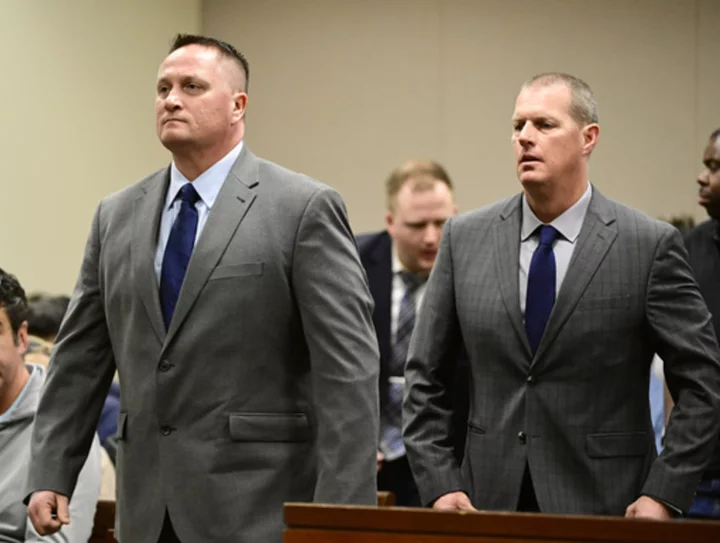BRIGHTON, Colo. (AP) — A Colorado prosecutor said Wednesday that two paramedics ”did nothing" to help an ailing Elijah McClain as he lay on the ground and instead injected him with an overdose of a powerful sedative that killed the 23-year-old Black man after he had been weakened by police neck holds when officers forcibly restrained him walking home from a convenience store.
The paramedics are charged with manslaughter and other felonies in the final jury trial over McClain's 2019 death in a Denver suburb. The trial is expected to explore largely uncharted legal territory because it is rare for medical first responders to face criminal charges.
Initially no one was charged because the coroner’s office could not determine exactly how McClain died. But social justice protests following the 2020 murder of George Floyd drew renewed attention to McClain’s case, and a grand jury indicted the paramedics and three officers in 2021.
The officers already have gone to trial and two were acquitted, including one who is back at work for the Aurora Police Department. The third officer was convicted of criminally negligent homicide and third-degree assault.
Aurora Fire Department paramedics Jeremy Cooper and Lt. Peter Cichuniec have pleaded not guilty to manslaughter, criminally negligent homicide and several counts each of assault.
“Jeremy Cooper and Peter Cichuniec were called to help Elijah McClain get medical treatment. He was their patient. But they didn’t do one thing that night to give him medical treatment,” Colorado Solicitor General Shannon Stevenson told jurors in her opening statement. “Instead, he faced down on the ground, not speaking, barely moving. The defendants injected him with an overdose of a powerful sedative, a drug that Elijah had no medical need for, and the defendants had no medical purpose to give.”
The paramedics’ attorneys did not return telephone calls or emails seeking comment ahead of opening statements, but they were expected to blame McClain's death on the officers who restrained him, including with a neck hold that left him temporarily unconscious.
Shortly after the ketamine injection, McClain, a massage therapist known for his gentle nature, went into cardiac arrest on his way to the hospital. He was pronounced dead three days later.
The amended coroner’s report in 2021 found McClain died from “complications of ketamine administration following forcible restraint.”
Prosecution experts who testified during the earlier trials did not all agree on the role the police's actions played in McClain's death but all said that the ketamine was the main cause.
McClain, who weighed 140 pounds (64 kilograms), was given a higher dose of ketamine than recommended for someone of his size and overdosed, Dr. Stephen Cina found in the amended autopsy report. McClain was extremely sedated within minutes of being given the ketamine, wrote Cina, who said he believed McClain was gasping for air when he was put on a stretcher.
McClain's death brought increased scrutiny to how police and paramedics use ketamine. It is often used at the behest of police if they believe suspects are out of control.
The fatal encounter on Aug. 24, 2019, began when a 911 caller reported that the man looked “sketchy” as he walked down the street wearing a ski mask and raising his hands in the air.
McClain, who was often cold, was walking home from a convenience store, listening to music.
Moments later, police stopped him and after a struggle put him in a neck hold. He was rendered briefly unconscious, prompting police to call for paramedics while officers restrained him on the ground.
One of the officers was convicted last month of the lesser charges he faced after defense attorneys sought to blame the paramedics. Randy Roedema faces anywhere from probation to prison time when he is sentenced next month.
Officer Nathan Woodyard, who was acquitted, has returned to work on restricted duty as he gets caught up on changes made at the agency since his 2021 suspension. They include reforms the department agreed to after a state attorney general's office investigation launched in 2020 amid outrage over McClain’s death found a pattern of racially biased policing and excessive force in Aurora.
Woodyard will get $212,546 in back pay.
The other acquitted officer, Jason Rosenblatt, was fired in 2020 for his reaction to a photo reenacting a neck hold like the one used on McClain. When officers sent the photo to him, he responded “ha ha.”
___
Brown contributed from Billings, Mont.

